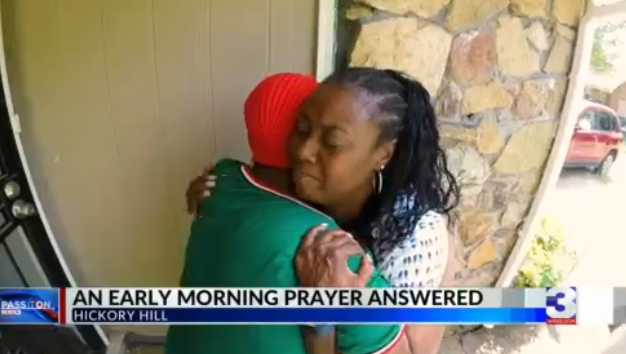JONESBORO, Ark. — Thrown in jail after not paying rent? It may be something you’ve never heard of, but it can happen to renters in Arkansas, and records show that’s still the case, even in the midst of the pandemic.
“It’s insane. I just couldn’t imagine why … that makes no sense to me.”
That was Amy Beckett’s response after she says her landlord didn’t just threaten to put her family out of the house — he threatened to have her thrown in jail.
The Jonesboro resident told WREG about a conversation she says she had with her landlord at the time.
“He said that we could be thrown out of the house, that the sheriff would come and put all our belongings at the curb, and that if he saw fit, he could have us put in jail,” Beckett explained. “And I said, ‘Well, I didn’t know they put you in jail for not paying your rent,’ you know? And he says, ‘Oh, they do.'”
Most Arkansans are evicted through civil court, but there is a statute on the books that allows landlords to file in criminal court.
It’s called Failure to Vacate. The law dates back to the early 1900s, and it’s currently the only one of its kind in the country.
Explaining Failure to Vacate
Lynn Foster, a retired legal professor, has been tracking evictions across Arkansas since the start of the pandemic. She also served on a committee several years ago that recommended a full ban on Failure to Vacate.
Foster explained: “If your rent is late by even as little as one day, the law cuts off the rest of your lease term, you forfeit the rest of your lease term. And if the landlord then decides that he wants you out, all that the landlord has to do is post a 10 day notice and you have 10 days to leave the premises. If you are not gone, then you have committed a misdemeanor offense at the end of the 10 days is the way the statute describes it. And you can be charged with failure to vacate, which is a criminal offense, and you can be fined.”
The next step is where Foster says renters can get locked up.
“What some people don’t realize is that since this is a criminal offense, if they don’t show up for the for the plea and arraignment hearing, they’ve now committed a new crime. And that’s failure to appear,” she said. “And at that point, the judge will typically issue a bench warrant, a warrant for the defendant’s arrest.”
There have been a number of attempts over the years to either abolish or change the Failure to Vacate statute.
There was the 2012 panel Foster served on that recommended a statewide repeal. A Pulaski County judge ruled the law unconstitutional in 2015, and many courts across the state simply stopped hearing the cases.
Then, in 2017, the Arkansas legislature made Failure to Vacate less punitive.
However, a ProPublica investigation released Monday found Arkansans are still facing criminal evictions, even in the midst of the pandemic and since the CDC issued its moratorium.
‘Renters don’t have any rights in Arkansas’
“At least 200 Failure to Vacate cases have been filed through 28 of the largest courts across the state and that a couple dozen warrants have been issued out of those because of people mostly not showing up to court,” said Maya Miller, an engagement reporter with ProPublica.
According to Miller, those numbers represent cases filed since mid-March, and include seven people who’ve been detained or sentenced during the COVID-19 crisis.
Miller shared stories like that of a Hot Springs woman who lost her restaurant job and fell behind on rent.
“On the day of her court date in July, woke up feeling sick. So did not go to court and then ended up with a warrant and then actually ended up being detained for six hours at the sheriff’s office and then had to pay a bond to get out,” Miller said.
ProPublica Data Reporter Ellis Simani said many people are unaware of the consequences of filing criminal charges.
“A lot of folks communicated to us that they didn’t think that the criminal eviction statute led to arrest or warrants or jail time,” Simani said. That included legislators, landlords and tenants.
Simani also said landlords told them the criminal eviction method is cheaper because they don’t need an attorney, and it’s often faster.
“You know, especially if you’re in a larger county where a lot of these cases move through through the court, you can take upwards around three weeks before you can essentially get the wheels moving. Landlords have told us that oftentimes they’ll post that notice and threatening criminal or criminal filing and tenants will move out then,” Simani explained.
Simani said it’s sometimes used as a threatening mechanism to get the tenants to move out.
Landlords aren’t recouping any of the costs for back rent or late fees, as they can in the civil process,” said Simani.
Beckett was eventually evicted, but it was through civil court like the majority of Arkansas renters.
“There’s nothing … renters don’t have any rights in Arkansas,” she said. “Basically, you have you have the right to leave. That’s about it.”
Court records reviewed by WREG and compiled by Foster reveal the bulk of the criminal evictions are filed in Garland County, which covers Hot Springs. There were others filed Polk County, which is west of Hot Springs, and some filed in Lonoke County near Little Rock.
Courts in counties in Northeast Arkansas like Crittenden and Craighead don’t typically hear criminal eviction cases anymore.
As far as civil evictions, a recent WREG investigation found filings had spike by double and triple digits in those areas.
We spoke with tenants’ rights advocates and attorneys who said additional funding for renters is needed so tenants can pay rent and landlords can recoup their lost money.
Services for renters facing eviction:
Tenants must fill out declaration and provide it to landlord
1-800-9 LAW AID (1-800-952-9243)
(901) 523-8822 or Toll Free (866) 361-9001
ProPublica also put together a guide for renters facing eviction.























